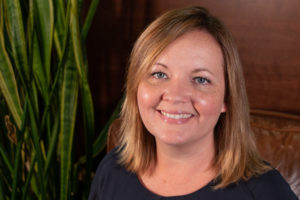
Colorado State University School of Social Work Assistant Professor Shannon Hughes has received a Larimer County Behavioral Health Services Distributed Services Fund award of $150,000 to develop an academic-community partnership project that supports greater peer-based services in mental health.
The funding will be used to organize, support, and empower an equalizing link—peer support—between mental healthcare professionals and service users/consumers, in an effort to advance a broader cultural shift toward greater inclusion and power sharing in professional-consumer healthcare relationships.
Hughes’ project, “Peer Support Expansion and Recovery Learning Community,” is designed to grow an active and thriving peer community across systems of care in Larimer County, Colorado.
In behavioral health, “peer” refers to someone who shares the experience of living with mental and emotional distress, or being in recovery from mental-health or substance-use challenges.
For example currently, one might serve as a peer support specialist in a behavioral health center, with responsibilities for modeling the value of client experiences, teaching coping and recovery skills, coordinating services, collaborating with therapists, and assisting clients in improving their well-being.
Moving local behavioral health care in new directions
Rather than training peers to work in the mental healthcare system as it exists, Hughes’ project goes beyond the traditional expert-focused model of “providing services” to an intentional peer support model of valuing expertise through lived experience and building mutual relationships.
“Our aim is a culture of healing that, at a foundational level, involves transforming the quality of the relationship between healthcare professionals and healthcare consumers, with particular attention to how power is shared and negotiated,” said Hughes.
Hughes’ team will coordinate the delivery of nationally recognized peer trainings, support the initiation of countywide Alternatives to Suicide peer support groups, and coordinate a network of peers across agencies in Larimer County, to form an independent Peer Recovery Learning Community.
“We aim to create an autonomous space in our community, one that exists outside of traditional behavioral health centers, for persons with lived experiences of mental and emotional distress to connect, learn, and grow in a framework of mutual support and co-learning,” Hughes said.
Redefining our understanding of mental health
MaryBeth Swanson, a collaborator and the cofounder of The Willow Collective, a network of private practitioners who support maternal, infant, and early childhood mental health in Larimer County, values the project’s potential for increasing understanding and aligning expectations.
“It requires deep listening and awareness of what arises in me when I am actively trying to hold another person’s trauma,” said Swanson. “To truly know another person and to accurately understand them is the heart of social work, and it is what peer relationships allow for.”
“After more than 25 years as a social worker, my growing awareness that the line between who is mentally well and who is mentally unwell is a whole lot more blurred than our current mental health system would have us believe,” Swanson said. “We don’t serve our community when we actively identify one person as well and one person as sick.”
Empowering approach grounded in relationships
Currently, individuals serving as peers are employed in small numbers in provider agencies across Larimer County.
“Our project is aligned with national trends towards greater peer alternatives,” said Hughes. “We will help grow an active, thriving peer community that will benefit both consumers and professionals across systems of care.”
For consumers, key benefits of peer support in mental health include the value of shared personal experience and empathy, a focus on an individual’s strengths instead of deficits, and positive expectations for people’s ability to process intense emotions and painful experiences.
“And a networked community of peers, in dialogue with one another and working together, ultimately benefits mental healthcare provider agencies where peers are employed,” Hughes said. “More training, improved quality of relationships, and greater respect for and inclusion of diverse lived experiences can improve practice environments for everyone.”
Hughes and her team will also provide ongoing technical support to evaluate the participatory research approach, and assess needs and relevant outcomes.
“My research focuses on critically analyzing the medical model of care as it has been historically applied to mental and emotional distress,” said Hughes. “Increased options, including peer-based psychosocial alternatives that situate power within and between individuals, can create new opportunities.”
“I believe that relationship may be the greatest tool we have,” added Hughes, “both as social workers and as humans who are ‘in this together.’”
The School of Social Work is part of CSU’s College of Health and Human Sciences.